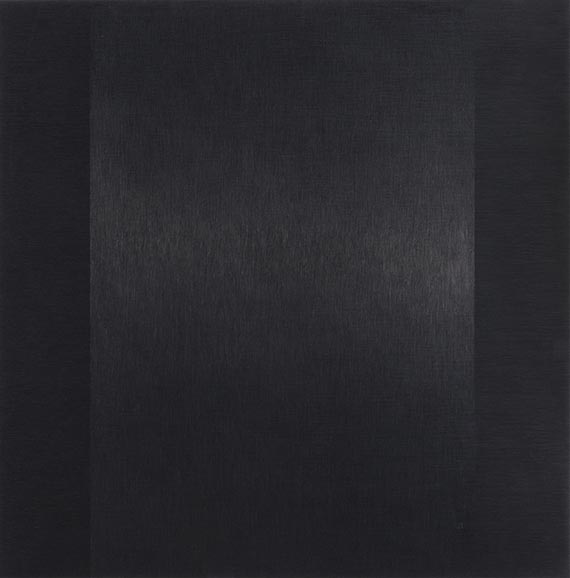Between the Lines - "Pole". 2000.
Graphite on a MDF plate, in the artist´s original frame.
Signed, dated, titled, and inscribed with two direction arrows on the reverse of the rear board. 60 x 60 x 5,8 cm (23,6 x 23,6 x 2,2 in). Incl. frame: 92 x 92 x 10 cm (36,2 x 36,2 x 3,9 in).
[AR].
• Strictly conceptual work reduced to geometric forms.
• Frank Gerritz is regarded as an important representative of conceptual art and is particularly known for his monochrome graphite and paint stick works.
• Art critic Donald Kuspit once praised the German artist as the last “abstract hardliner”.
PROVENANCE: Private collection.
From a North German collection.
EXHIBITION: Frank Gerritz. Coded Language, Galerie Vera Munro, Hamburg, 2001.
In good condition. Four to five very small light spots of unknown origin in the lower right corner, possibly studio marks. The frame has minor handling marks and dirt. Not unframed for cataloging.
Graphite on a MDF plate, in the artist´s original frame.
Signed, dated, titled, and inscribed with two direction arrows on the reverse of the rear board. 60 x 60 x 5,8 cm (23,6 x 23,6 x 2,2 in). Incl. frame: 92 x 92 x 10 cm (36,2 x 36,2 x 3,9 in).
[AR].
• Strictly conceptual work reduced to geometric forms.
• Frank Gerritz is regarded as an important representative of conceptual art and is particularly known for his monochrome graphite and paint stick works.
• Art critic Donald Kuspit once praised the German artist as the last “abstract hardliner”.
PROVENANCE: Private collection.
From a North German collection.
EXHIBITION: Frank Gerritz. Coded Language, Galerie Vera Munro, Hamburg, 2001.
In good condition. Four to five very small light spots of unknown origin in the lower right corner, possibly studio marks. The frame has minor handling marks and dirt. Not unframed for cataloging.
26
Frank Gerritz
Between the Lines - "Pole", 2000.
Starting bid: € 10,000 / $ 11,800
Headquarters
Joseph-Wild-Str. 18
81829 Munich
Phone: +49 89 55 244-0
Fax: +49 89 55 244-177
info@kettererkunst.de
Louisa von Saucken / Undine Schleifer
Holstenwall 5
20355 Hamburg
Phone: +49 40 37 49 61-0
Fax: +49 40 37 49 61-66
infohamburg@kettererkunst.de
Dr. Simone Wiechers / Nane Schlage
Fasanenstr. 70
10719 Berlin
Phone: +49 30 88 67 53-63
Fax: +49 30 88 67 56-43
infoberlin@kettererkunst.de
Cordula Lichtenberg
Gertrudenstraße 24-28
50667 Cologne
Phone: +49 221 510 908-15
infokoeln@kettererkunst.de
Hessen
Rhineland-Palatinate
Miriam Heß
Phone: +49 62 21 58 80-038
Fax: +49 62 21 58 80-595
infoheidelberg@kettererkunst.de
We will inform you in time.




 Lot 26
Lot 26 
